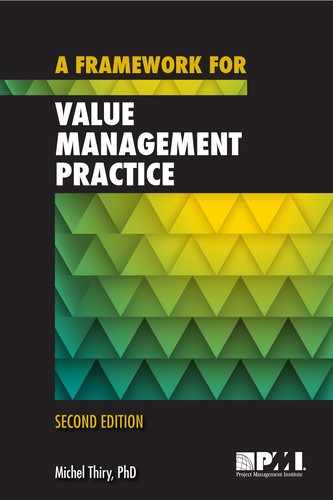Preface
The second edition of this book has been updated to reflect the evolution of value management (VM) practice since the mid-nineties. I could have re-written it completely, as VM practice has evolved into many different areas since the first edition was written, but have decided to keep its framework and structure as it reflects the use of VM in a project environment. Chapters I to III have been updated with the recent developments in VM practice. Chapter IV has been completely rewritten to reflect the emergence of program management and the current thrust of the project management community towards agile and organizational management.
For many years, the terms value analysis (VA) and value engineering (VE) have been used alternately, and there is still disagreement on their exact meanings. Their understanding depends, for the most part, on the country or the national association using them. In this book, value management includes both value analysis and value engineering. The worldwide consensus today is to use value management to describe the integrated widespread application of value methodologies. It encompasses function analysis, value engineering, value analysis, value control (validation), and other value techniques. Value management also involves the skills and knowledge needed to manage the value process by applying the correct tools and techniques at the appropriate time, allowing the greatest benefit to the project or program. It involves the formulation, organization, deployment, and mastery of the activity as well as team preparation. Today, as the concept of value is widening, many other areas of business use these or similar techniques (e.g., business analysis and financial economics.
The value management methodology is based on a few determining principles and concepts that are the framework upon which value practitioners build and add substance through constant sharing of ideas. This book was originally inspired by the work and experiences of leading value practitioners and more recently, by new applications of value methodologies. It aims to provide a scope of current practices, from which seasoned value practitioners and those new to the field may extract principles, concepts, tools, and techniques to develop their own individual value management practices. Therefore, the book should be seen as a stepping stone as value management continues to evolve.
In the first chapter, I have aimed to provide the background needed to understand the origins of value management. The second chapter comprises a description of value management’s guiding principles and concepts, and the third chapter describes tools and techniques that can be used to achieve the objectives of a value study, including integrative techniques developed in the last 15 years. The fourth chapter covers value integration, and more specifically integration within an organizational project management (OPM) context.
The last section has been organized into two topics: Value Associations, which offers a list of the best known value management associations around the world with websites and References, which contain all the references used in this new edition.
